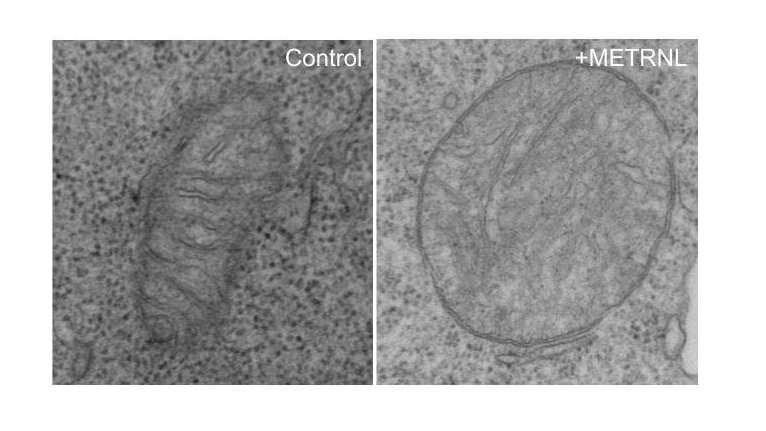Study shows Meteorin-like protein drains energy from T cells, limiting immune system’s power to fight cancer


The image on the finest exhibits an unhealthy mitochondrion in a T cell uncovered to METRNL. Credit: Christopher Jackson, M.D.
A protein called Meteorin-love (METRNL) in the tumor microenvironment saps energy from T cells, thereby severely limiting their ability to strive against most cancers, in step with modern be taught directed by investigators at the Johns Hopkins University School of Medication and the Johns Hopkins Kimmel Cancer Middle and its Bloomberg~Kimmel Institute for Cancer Immunotherapy.
Discovering techniques to block the outcomes of METRNL signaling on tumor-infiltrating T cells could perchance additionally enable these immune cells to salvage the energy mandatory to eradicate tumors.
A chronicle about the work used to be printed Aug. 6 in the journal Immunity.
METRNL has been described in the scientific literature earlier than—first and well-known as taking half in a role in helping maintain frigid or exercising animals (and americans) warm by poking holes in the mitochondria (energy manufacturing facility) of fleshy cells so they assassinate heat. Nonetheless, it had no longer previously been known to be active in most cancers or in T cells, says lead learn about creator Christopher Jackson, M.D., an assistant professor of neurosurgery at Johns Hopkins.
When T cells strive and eradicate a tumor, the express of persistent stimulation/stress causes them to secrete METRNL, Jackson explains. As soon as METRNL is secreted, it interacts with the mitochondria and pokes holes in the electron transport chain, a cluster of proteins taking fraction in a job to assassinate energy.
When T cells can no longer maintain up with their energy requirements, they stay trying to atomize most cancers cells, which enables most cancers cells to multiply and spread.
“Others have shown that metabolic dysfunction limits T cells’ ability to strive against most cancers, but we’re amongst the predominant to affirm a discrete signaling pathway that causes that to occur,” Jackson says.
“Most of the previous work has checked out how the scarcity of particular nutrients in tumors limits a T cell’s ability to operate. The disclose is here is no longer easy to switch on legend of it be laborious to get the finest nutrients actual into a tumor and relate them to T cells.
“We perchance can end mighty better by concentrating on a signaling pathway on legend of we can block it or flip it on or off, but except now, nobody had identified such a pathway that restores the metabolic smartly being of T cells in tumors.”
In a series of laboratory investigations, researchers first studied T cells from the tumor tissue and blood of sufferers with previously untreated mind tumors (glioblastomas), prostate most cancers, bladder most cancers and renal cell/kidney most cancers, and performed RNA sequencing to strive and title genes accountable for dysfunction in the tumor. METRNL used to be the gene most extremely expressed.
Next, they wished to uncover out what makes T cells secrete METRNL in the predominant put of dwelling, discovering that the aim used to be persistent stimulation. Customarily, the immune draw prompts when stimulated to strive against an an infection and then diminishes when that illness resolves. But in the environment of most cancers, T cells are chronically stimulated, which causes them to alter into dysfunctional.
METRNL used to be also came upon to be secreted by other immune cells in tumors such as macrophages and dendritic cells, but it no doubt acts namely on T cells.
Further be taught decided that METRNL acts straight on the mitochondria, and decouples the electron transport chain. As T cells lose energy and originate to fail, they expand their makes an try to use glucose (natural sugar) as a backup supply of energy.
But, for the reason that tumor atmosphere is low in glucose, they proceed to flounder and in the extinguish die. Here is conception to be one of many techniques that tumors can proceed to develop. Deleting METRNL in units of diversified most cancers kinds in the researchers’ investigations universally delayed tumor progress.
In the extinguish, researchers noticed that METRNL is activated through a family of transcription components (proteins that administration the charge of transcription of genetic knowledge from DNA to RNA) called E2F, that it relies on signaling by a receptor called PPAR delta, and that modulating these components downstream can block the outcomes of METRNL.
The following steps are to ascertain how this can additionally support sufferers, Jackson says. He and his colleagues are actively working on diversified technique to focal point on the METRNL-E2F-PPAR delta pathway or to combine centered treatment with other immunotherapies.
“We deem that conception to be one of many explanations that some present immunotherapies fail is they require extra energy from immune cells that already are functioning at decreased capacity,” he says. “Blocking the pathway could perchance additionally enable these immunotherapies that per chance don’t have any longer been effective prior to now to be extra perfect on legend of there will doubtless be enough gasoline for the T cells to meet that elevated ask.”
More knowledge:
The cytokine Meteorin-love inhibits anti-tumor CD8+ T cell responses by disrupting mitochondrial characteristic, Immunity (2024). DOI: 10.1016/j.immuni.2024.07.003. www.cell.com/immunity/fulltext … 1074-7613(24)00352-2
Quotation:
Stare exhibits Meteorin-love protein drains energy from T cells, limiting immune draw’s energy to strive against most cancers (2024, August 6)
retrieved 6 August 2024
from https://medicalxpress.com/files/2024-08-meteorin-protein-energy-cells-limiting.html
This document is area to copyright. Other than any lovely dealing for the aim of non-public learn about or be taught, no
fraction could perchance additionally perchance be reproduced with out the written permission. The bellow is equipped for knowledge capabilities handiest.














